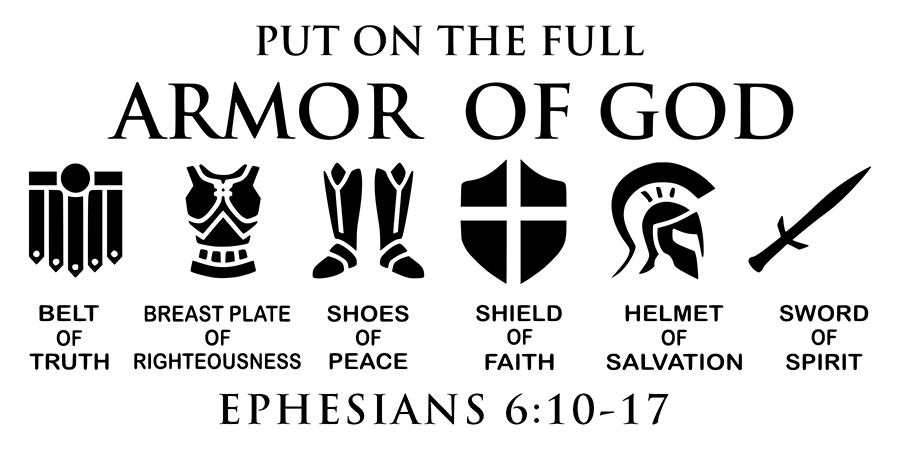You are in Beware the Wolves -> List of False Teachings
There is only one true Christian Church, which was founded by Jesus, and which is comprised of all believers in Christ worldwide, called the “Church of God” or the “Church of Christ” – all other so-called “Christian churches” are counterfeits. And all the man-made divisions into the sects, denominations, and “reformed” churches that we see today (Methodist, Baptist, Lutheran, Presbyterian, Pentecostal, Adventist, Calvinist, Reformed, etc. ad nauseum…), each with their own set of differing beliefs, doctrines, and teachings (and false teachings), is not Scriptural.
In fact, while it may sound harsh, it is a matter of fact (and truth) that these sects and denominations are simply baby “harlots,” offspring of “BABYLON THE GREAT, THE MOTHER OF HARLOTS AND OF THE ABOMINATIONS OF THE EARTH” per Revelation. As it is written: “So have I become your enemy by telling the truth?” I am doing so out of love and concern for your eternal soul, and I sincerely and earnestly hope and pray that the true brothers and sisters in Christ who find themselves in these sects and denominations will “come out of Babylon” and return to worshiping the Lord “in spirit and in truth,” by returning to the church which Jesus founded and the pure gospel teaching and practice of the Apostolic Christian era.
Wayne Jackson writes: [1]
What was the first century church called? How were the early disciples designated?
There were several appellations employed to describe the first-century believers, e.g., disciples, saints, brethren, etc. But beginning in Acts 11, the early disciples were formally called Christians — first at Antioch of Syria (Acts 11:26; cf. 26:28; 1 Pet. 4:16).
And interestingly enough, the word “called” in Acts 11:26 is a very special word that has to do only with a divine sort of calling. It is a calling that issues from God as its source. They were divinely called “Christians.”
Why would men set aside that name, and designate themselves by human heroes (e.g., Lutheran)? Or name themselves after some form of organization, (e.g., Presbyterian)? Or adopt titles according to some individual point of doctrine they espouse, (e.g., Baptist)? There is no scriptural basis for this common practice.
Tell me please, why are those who profess allegiance to Jesus Christ dissatisfied with simply wearing the name “Christian”? Why are they not known as just “churches of Christ” (Rom. 16:16) or “churches of God” (1 Cor. 1:2) — either appellation being entirely scriptural. There is no solitary, exclusive name for the church. But whatever you call it, you need to call it what it is, and not what it is not.
The church is not a Pentecostal church just because it was established on the day of Pentecost. The church is not a Baptist church just because it advocates baptism. The church is not a Congregational church just because it is organized congregationally. The church is the church of God (1 Cor. 1:2), because God planned it.
Congregations are the churches of Christ (Rom. 16:16), because Christ gave his life in order to bring them into existence. The New Testament indicates that we ought to speak as the oracles of God (1 Pet. 4:11), which means we ought to express biblical concepts with biblical terms whenever possible.
Christ prayed specifically for unity among Christians (see John 17), and it is written: “There is one body and one Spirit, just as also you were called in one hope of your calling; one Lord, one faith, one baptism, one God and Father of all who is over all and through all and in all” (Ephesians 4:4-6). The sectarians and denominations of today disregard that prayer of Christ for unity.
An excerpt from The Christian Church, Its Rise and Progress by H.M. Riggle is helpful here: [2]
The church of God includes the family of God, and it is but one family in Heaven and on earth; therefore, it includes in its membership every Christian, all the redeemed in paradise and all the saved on earth. Including all Christians, it is not a sect, but is the whole. Now, a church that does not include in its membership all Christians in Heaven and earth cannot be God’s church, and hence it is a sect. All the religious denominations taken together come far short of including all Christians. Before any of these institutions arose, there were millions of Christians. None of the blood-washed saints in paradise are now members of any of these earth-born institutions; and right here upon earth there are tens of thousands of happy saints in robes of righteousness who have come out and stand clear of creed-bound churches, and there are many thousands of others who are saved from sin and have never joined any of them. Therefore, all denominations put together, both Roman, Greek, and Protestant, do not constitute the universal church, but are only sects.
In holding membership in the one universal church and in no other, we stand clear of the sin of division; are members of no sect, but members of that church to which all the saved in Heaven and earth belong.
And more: [3]
So the church of God stands out before us the most beautiful, visible institution on earth.
Sects, then, are not necessary to make the church visible. In this respect they are worthless. This theory is generally circulated by sectarians in defense of their own rival organizations, that the constitution of sects is essential to the visible manifestation of the church. A sect is a portion “cut off.” Is there any sense, reason, or divine truth in the teaching that an invisible body is made visible by cutting off a portion of it? None of the present sects came into existence until the third century. Was God’s church an invisible thing on earth for nearly three hundred years? Who can affirm that the multitude of sects have made visible the church of God, from which they are severed by their particular creeds? We affirm in the presence of the Judge of all men, with a clear consciousness of His truth to support our proposition, that the creation of the sects of Christendom have had exactly the opposite effect.
Their traditions have made “the Word of God of none effect.” Their confusing creeds, heaps of rubbish, and interminable machinery have utterly subverted and well-nigh hidden the church that Jesus built. As the historian D’Aubigne says, in the third century an “earthly association,” “an external organization,” was gradually substituted for “the interior and spiritual communion which is the essence of the religion of God.” Then, says the historian, “the living church retired gradually within the lonely sanctuary of a few solitary hearts”; that is, the real church of God was almost hidden from view by the overspread pomp of the false. So, then, men’s sects do not make visible God’s church, but, on the contrary, obstruct her life and obscure her glory. These are facts of the history that no honest and intelligent man can deny.
The Babel of human sects long obscured the sight of the church of the first-born.
Wayne Jackson writes: [4]
Denominationalism
The word “denominate” means “to give a name to, to designate.” It is a perfectly respectable term. If one cashes a two-hundred-dollar bank draft, he may request currency in “denominations” of tens and twenties. In this sense the word merely signifies a separation into various divisions by name. And so the term itself is not “tainted.”
“Denomination” takes on a less-than-ideal sense when one considers its popular use in the lexicon of “Christendom.” “Christendom” is a term that embraces the entire religious terrain that professes any identification – however remote the connection may be – with Jesus Christ. This would include every kind of organism, from the Unitarian Universalist Church, to the various cults that allege an association with Christ (e.g., Christian Science, the Watchtower movement, etc.).
One authority defines denominationalism in the following fashion.
“The system and ideology founded on the division of the religious population into numerous ecclesiastical bodies, each stressing particular values or traditions and each competing with the other in the same community under substantial conditions of freedom” (Brauer, pp. 262-263). [5]
Within this definition several flaws are revealed that mar the system.
(1) Denominationalism is the result of division – a division, incidentally, that frequently is applauded.
(2) The ideology accommodates variant “ecclesiastical [church] bodies” with distinctive, doctrinal differences.
(3) Denominationalism tends to focus more upon tradition and preferential values than Scripture.
(4) The system engenders a spirit of adversarial rivalry rather than cooperation.
(5) The denominational concept encourages the idea that the freedom to differ on major points of doctrine is a healthy spiritual phenomenon.
Each of these propositions is antagonistic to biblical truth. …
Conclusion
The spirit of denominational compromise is steadily invading more and more churches that once repudiated the disposition. Prominent personalities openly advocate that the “mode” of baptism is irrelevant, or that the rite, in terms of its purpose, may be received either as “for” the remission of sins, or “because of” the remission of sins; it does not matter. Doors of fellowship are flung open, and sectarian groups are embraced.
Far too many imagine that the church is a “democracy” in which the people decide what is permissible procedure, rather than recognizing that Christ’s church is a kingdom. And the King is the author of its law (1 Cor. 9:21; Gal. 6:2).
Denominationalism is wrong. There must be no compromise on this issue. Christians can and should oppose the system compassionately and courteously, but it must be resisted relentlessly. To neglect to do so is to fail in one’s responsibility.
Wayne Jackson further writes: [6]
The New Testament is the only place to which we can turn to learn about the church of Christ. We recall that the church is described as the eternal purpose of God (Eph. 3:9-11). It is obviously very important. It is necessary, therefore, that we are educated by the New Testament and not by the ideas of men.
The New Testament teaches us what the church is, and what the church should be today, according to the plan of God.
First, the church was built and purchased by Christ (Matt. 16:18; Acts 20:28). No one has the right to start a church as a divinely approved institution (cf. 1 Cor. 1:10-13). Christ, the Son of God, is the only one qualified, and he has established his church (cf. Eph. 4:4; 1:22-23).
After religious division arose within the church at Corinth, Paul asked some probing questions. “Is Christ divided? Was Paul crucified for you? Or were you baptized in the name of Paul?” (1 Cor. 1:13). The church belongs to Christ on the basis of these gospel truths. He died for it. He built it. He lays down requirements through which we can belong to him. The church belongs to Christ. He is the head of the church (Col. 1:18).
Second, the church that belongs to Christ began on the day of Pentecost as recorded in Acts 2. Religious bodies that have their origin in Rome, Zurich, London, or any other place but Jerusalem, are ones that started in the wrong places. The Lord’s church was founded by Christ through the preaching of the apostles in Jerusalem, corresponding to Old Testament prophecy (Is. 2:2-4).
When the gospel was preached by Paul, and others, throughout the ancient world, different denominations were not set up. Whenever the pure gospel of Christ was taught, just as it was preached for the first time in Jerusalem, the result was simply Christians who belonged to Christ — collectively the church of Christ — when people obeyed the gospel.
If there was no congregation of the Lord’s church in your hometown, and you started teaching others about the death of Jesus, the benefits of his redemptive blood, and the requirements of the New Testament to have the forgiveness of sins — you would not be setting up a denomination. Rather, you would be following the New Testament pattern, and those who obey the gospel would be a part of the Lord’s church. The church of Christ would then exist in your hometown, and the New Testament alone would be its guide for work and worship.
Third, only divinely appointed names were worn by the church. Such designations like church of Christ (Rom. 16:16) and church of God (1 Cor. 1:2) are scriptural names that describe the church as belonging to Christ and God.
“The church of Christ” is not a denominational title that describes a religious institution established by men. Rather, it is the collective reference to the people of God in the world — people who follow the New Testament teaching regarding the church.
See also the chapter on Finding a Church.









